While writing about Candi Staton’s ‘Evidence’ a couple of weeks ago, I got to thinking, again, about how backing vocals are used in recordings and live performances. In passing, I also mentioned Aretha Franklin’s ‘Chain of Fools’ and Gladys Knight and the Pips’ ‘Midnight Train to Georgia’.
I’ve had those Pips in my head ever since. And I’ve been thinking about Gladys Knights and the Pips (GKP) as a unit. Despite the significant solo successes Gladys Knight has had without her most famous fellow musicians, they need to be remembered as a group.
Despite some stiff competition (I won’t name other examples here, though I invite suggestions in the comments), ‘Midnight Train to Georgia’ remains, for me, the epitome of what can be done with backing vocals. In fact, it’s an arrangement that opens a whole range of questions about what even classify as ‘backing’ vocals. But I’ve resisted writing about this song until now, partly because I felt all that needed to had been said or written about ‘Midnight Train to Georgia’, and partly because I’ve never really known how to approach in words this fabulous sonic creation.
I still don’t really know, but I’ve found myself wanting to try. There are several directions I’m tempted to go with the song, which has now been with us for more than half a century. One way would be to provide a song itinerary, to go through its original formation as ‘Midnight Plane to Houston’, then Cissy Houston’s rework, then GKP and on to so many other versions, including the Nashville-focussed version by Eddie Middleton, Alice Tan Ridley’s call out to New York, and the brief rendition of ‘Midnight Train from Zamunda’ that appeared in Coming 2 America (performed by Gladys Knight and a chorus of substitute Pips).
That would be a nice, place-based way to narrate the song’s story, something I often do when telling anyone who’ll listen about why I felt the need to track down songwriter Jim Weatherly’s debut album and the 2019 Reel reissue of Cissy Houston that featured ‘Midnight Train’ as a bonus track.
It wouldn’t, however, do justice to those backing vocals, which are such a vital ingredient of the most famous version of the song. I’ll stick with an account that focuses on those vocals, but also more generally on the role of the Pips and on some of the contexts in which the song has been performed. In focussing on the Pips, or GKP as a whole unit, I don’t intend to diminish Gladys Knight’s phenomenal vocal delivery on ‘Midnight Train’—I could probably write 1000 words just on what she does with phrasing and timing for a starter. Rather, I’m interested in thinking about what the interaction between the group members might tell us about our a more general need we all feel for a chorus that will do for us what the Pips did for Gladys.
We also need to consider GKP as an audiovisual unit. While I regularly play the studio version of ‘Midnight Train’ that appears on the 1973 album Imagination—not least because the album as a whole is brilliant—I’m as likely to pull up one of the many online videos that remind us that GKP was a complete package that incorporated vocals, choreography, fashion, elegance, cool and just sheer fun. And while the arrangements and tempo of ‘Midnight Train’ would vary in live performance over the years, two things that remained relatively stable were the vocal arrangement and the choreography.
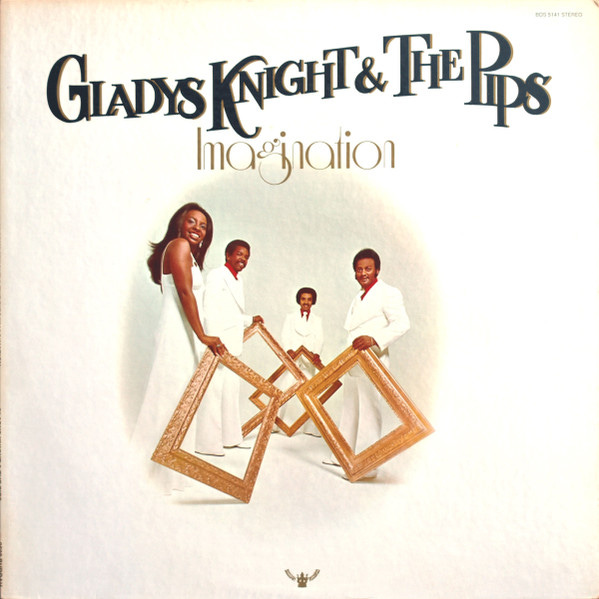
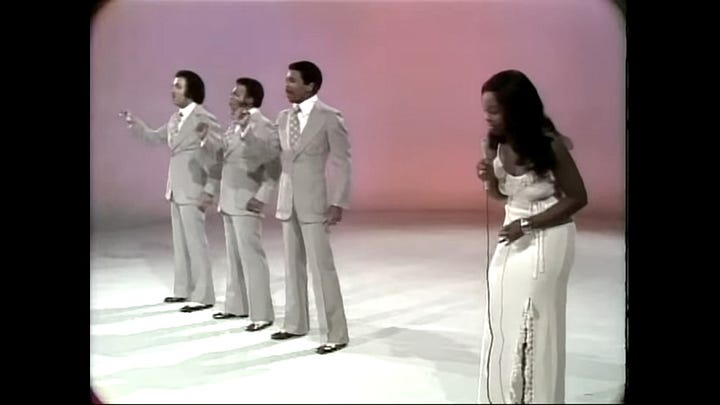
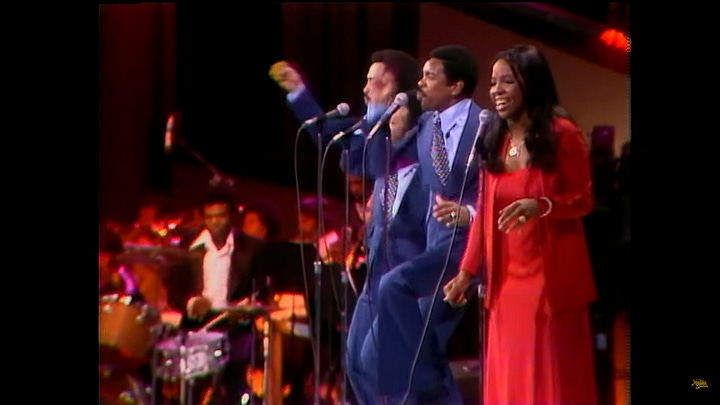
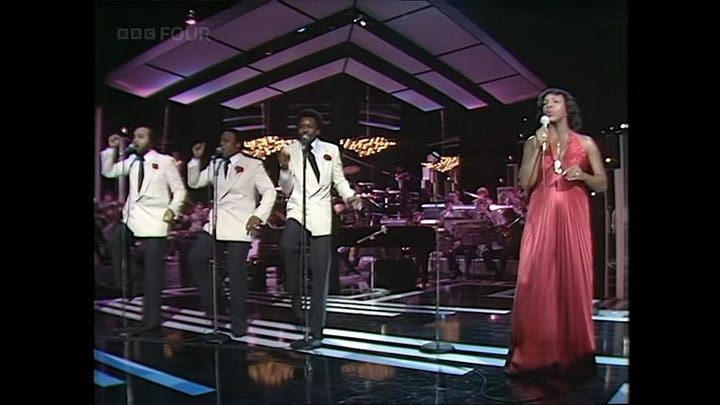
‘Backing’
The word ‘backing’ doesn’t really do justice to what the Pips—William Guest, Edward Patten, and Merald ‘Bubba’ Knight—contribute to ‘Midnight Train’. It’s true that they provide some of the expected back-up in the form of canon-like repeated lines, some ‘oohs’ and those famous train sounds (which I’ll render as ‘wooh! wooh!’ - see note below). But they also act as kind of Greek Chorus, providing commentary and guidance to the singer, filling out details in the story. They create a distinct song within the song, akin to what the jazz musician William Parker calls an ‘inside song’.
What does that song look like ‘on paper’? On lyric sites, it’s common practice to render backing vocals in parentheses and those sharing the lyrics to ‘Midnight Train’ tend to follow this rule. What happens when we take these words out of the brackets—and out of the song— and present them without the ‘lead’ vocal?1
Too much for the man, he couldn’t make it He said he’s going Going back to find Leaving Leaving on the midnight train Going back to find Whenever he takes that ride, guess who’s gonna be right by his side I know you will Leavin’ on that midnight train to Georgia, wooh! wooh! Live in his world Her world is his, his and hers alone Dreamin’ A superstar but he didn’t get far Dreams don’t always come true, u-huh, no, u-huh Oooh, oooh, oooh, oooh Oooh, oooh, oooh, oooh Leaving Leaving on that midnight train Going back to find Whenever he takes that ride, guess who’s gonna be right by his side I know you will Leavin’ on that midnight train to Georgia, wooh! wooh! Live in his world Her world is his, his and hers alone
Okay, so it’s a bit clunky and artificial. And, of course, the song works as a combination of all its elements. But there’s something that’s more than just the ghost of a song here. One thing I notice by focussing on the Pips’ words is how direct they are, brutal even. Where we might expect backing vocals to smooth the rough edges of a lead lyric, to offer some comfort or caress or perhaps empathetically confirm the sadness or joy of the song, what we get here is a no-nonsense summarising of the hard way life can be—he couldn’t make it, he didn’t get far—alongside affirmation of the solution: leaving, guess who’s gonna be there by his side, I know you will, gonna board the midnight train and go.
In my Candi Staton post, I linked to 20 Feet from Stardom, the film about the careers and dreams of female backing singers. There are also a couple of excellent BBC radio programmes about backing vocals and vocalists: Nick Barraclough’s ‘R.E.S.P.E.C.T.: The Art of Backing Vocals’, from 2009, and an episode of Tom Service’s The Listening Service from 2019 on ‘Why Backing Vocals Matter’. Both attend to the sense of community that backing vocals promise and how that community extends to other listeners by modelling ways of joining in. Service puts it nicely:
‘Backing singers and opera choruses … make a bridge of resonating, reverberating empathy from the song through the community of its singers to the audience. Yes, we admire and we’re awed by the soloists, the principals at the front there, but we’re invited to join in, to feel, to move, to sing along by those diamond-setting backing singers, by those jewels of the opera house that are the members of its full-voiced chorus. They make all of this music ours, not theirs.’
Both BBC programmes culminate with ‘Midnight Train to Georgia’, treating it as the destination the other examples have been heading towards. Barraclough claims that ‘the evolution of backing vocals is encapsulated in that one song by Gladys Knight and the Pips’, while his guest Harvey Brough (who provides a walkthrough of what’s happening in the song from 24:26) also points out the importance of restraint in what is a vocally very full track, noting that ‘sometimes [the Pips] do nothing and that’s superb’.
The more I think about what’s happening in ‘Midnight Train’, the more I feel that the Pips’ very first line is the key. While perhaps not as memorable as the repeated ‘wooh! wooh!’ of the choruses or the ‘superstar’ line that gatecrashes the second verse, it’s the moment that establishes what the Pips’ role is going to be. It’s the first point where they move from repetition of the lead vocal (‘too much for the man’) to prompting or even leading the narrative (‘he couldn’t make it’). Once the second part of that line is delivered, nothing is going to be regular in terms of ‘backing’ vocals for this song.
Choreography: wooh! wooh! as gesture
In television appearances and concerts, the Pips would appear in the same relative position to each other and, to an extent, to Gladys Knight. From the audience’s perspective, this would be, from left to right, Guest, Patten, (Bubba) Knight, with Gladys to the right of them and usually in front. The choreography for each song would be similarly consistent; for ‘Midnight Train’ this would include a combination of spins, a front-facing, legs-apart, hands-down stance, sideways train motions, over-the-shoulder interjections (faces turned to audience, bodies sideways on) and the essential operating of the train horn to accompany the ‘wooh! wooh!’s.
Like other soul and R&B groups, the Pips would perform in matching outfits that gave the group a strong identity and also added to the sense of synchronicity in the vocal lines and dance moves (a rare exception that proves the rule can be found on this GKP-hosted episode of Midnight Special). When watching them online, I’m always interested in seeing how different GKP outfits complement my enjoyment of the performance. My inner nerd is also fascinated by other aspects of the concert or televisual mise en scène: how the Pips get both doubled and dismembered or decapitated by a mirror during a 1974 TV appearance (Example 1 below); how the fade out of the studio recording is used or not, and the choreographic consequences of this (see Examples 2 and 3 below for how the song resolves when not faded out); what happens when the Pips are given a bit more space to stretch out (Examples 4 and 5).
Example 1: A television performance of ‘Midnight Train’ in 1974: the Pips doubled and decapitated.
Example 2: Ending of ‘Midnight Train’ from Solid Gold performance in 1981 (with Dionne Warwick).
Example 3: Ending of ‘Midnight Train’ from April 1981 concert at New London Theatre.
Example 4: A performance of ‘Midnight Train’ at Six Flags Over Georgia.
Example 5: The Pips’ entrance at the start of a 1977 Los Angeles concert.
What happens when one of the vital elements of the GKP unit is removed? This idea is played with in a comedy routine on the 1977 television special The Richard Pryor Show, in which the Pips are shown performing their parts to ‘I Heard it through the Grapevine’ and ‘Midnight Train’ without Gladys.
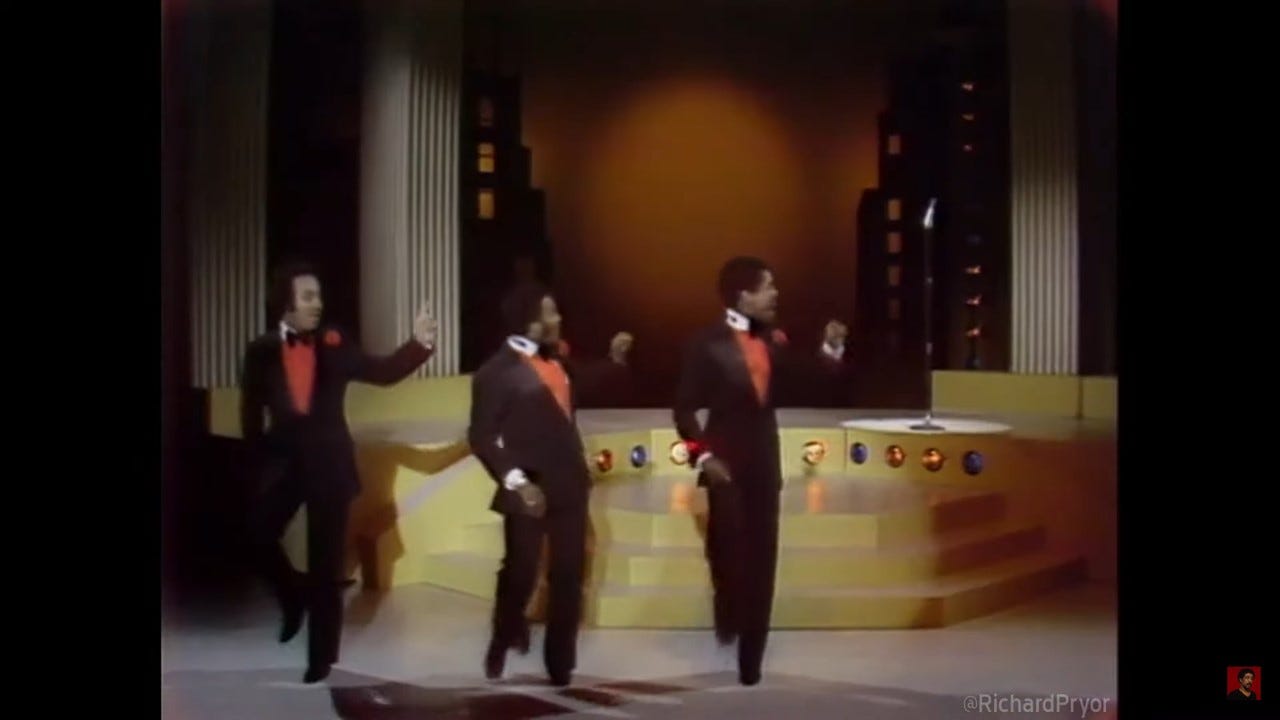
As well as being a kind of parody of the GKP dynamic, the Pryor performance works both to highlight the Pips’ vital role in ‘Midnight Train’ (as if we hadn’t noticed!) and to make it clear that all parts of the dialogue are needed. Their vocals alone no more constitute the song than if Gladys were to sing it solo; all the elements have to be in play for the song to work, because, moving and pleasing as Jim Weatherly’s original and Cissy Houston’s version remain, the song has become the result of what is created by the GKP elements in tension and harmony with each other.
Parody
As classic songs often do, ‘Midnight Train’ has generated many homages and parodies. This is no doubt helped by the many isolatable, memeable elements in the audiovisual performance: the adaptability of the train/destination narrative, the backing vocals, the choreography and—as the Pips’ performance on The Richard Pryor Show highlighted, albeit through absence—the interaction between lead singer and Chorus.
One way to parody the song and its various performances has been to replace the original Pips. In a trick video made for the American Idol Season 7 finale, Ben Stiller, Jack Black and Robert Downey Jr stand in for Guest, Patten and Knight in a nod to an iconic 1970s GKP television appearance.
It’s played for laughs, with Downey Jr disappearing behind the set during an overextended ‘sideways Pip’ move, and Black somehow losing his trousers in a follow-up stunt. At the same time, like the emphasis on the absent Gladys in the Pryor show, it underlines the importance of having the whole unit in place and on form for the song to work. The song and its choreography are, in this sense as much of a unit as the group themselves. The song can survive changes in tempo (live performances are generally faster than the recorded version, meaning the Pips have to dance slower when miming on some TV shows). The choreography can survive tempo shifts too, as well as changes in fashion. It continues working as a whole as long as the main elements are in place.
In Season 2 of 30 Rock, Kenneth (Jack McBrayer) decides to go back to Georgia on the midnight train, prompting a rendition of the song by Tracy (Tracy Morgan), Grizz (Grizz Chapman) and Dotcom (Kenneth Brown), with Tracy taking the lead vocal for a New York-based first verse and the other two providing backup. Further into the sequence the dynamic changes as Jenna (Jane Krakowski) belts her way into the lead spot, forcing Tracy to become the third Pip. The scene becomes more surreal as a separate scene involving Jack (Alec Baldwin), Liz (Tina Fey) and C.C. (Edie Falco) finds new ways to use the vocal ad libs from the original ‘Midnight Train’ recording (‘my world, his world’, ‘his and hers alone’, ‘I’ve got to go’). For the final part of the sequence, as it turns out that the train was scheduled for 11:45 and Kenneth has missed it, the Pips provide new words appropriate to the plot, playing on the audience’s knowledge that the Pips are as much Greek Chorus as backing singers. There’s also a brief cameo from Gladys Knight at the end of the song.
Gladys’s willingness to join in with parodies of her most famous performance is also shown in her appearance in Coming 2 America, where she sings new words for the song as ‘Midnight Train from Zamunda’. Again, the substitute Pips take on a Greek Chorus role by providing additional commentary.
Entrances and exits: I’ve got to go
When Tina Fey’s character uses the ‘I’ve got to go’ line while exiting the scene in 30 Rock, she is emulating a practice initiated by Gladys Knight herself. Originally added as an overdubbed adlib when the production team felt a bit more was needed for the studio recording of ‘Midnight Train’, the line—along with variations on ‘my world’, ‘his world’ and ‘her world’ voiced by Gladys or the Pips—has become a staple in live performances of the song. Gladys has been using the ‘I’ve got to go’ line from ‘Midnight Train’ as a prompt for a stage exit for some years. In the clip below she introduces the song (at 16:18) by telling the audience she has a train to catch. At the end (18:10 - a brief rendition), she cuts the song short with ‘I got to go’, leaving stage left as the Pips make their way off stage right.
Be My Pips
I said earlier that the song needs the dialogic elements of singer and backing vocals. I stand by that, and I couldn’t disagree more with Simon Cowell when he tells Crystal Bowersox on American Idol that the backing vocals should be removed from a twenty-first century rendition of ‘Midnight Train’ because they sound ‘old fashioned.’
While I’m aware that there are some great performances of ‘Midnight Train’ that either dispense with backing vocals or do something different with the contrapuntal elements—Kelly Rowland’s piano and solo vocal rendition, for example, gets to the heart of the song’s unresolved sadness, making a nice connection to its country roots—it’s hard to hear such versions without at least imagining the gaps being filled in.
There’s something about the song that calls for its Pips. Perhaps that’s why, years after the unit disbanded, there’s a shared desire for audience members to take on the Pips role. This clip of Gladys performing for Whoopi Goldberg’s televised birthday special shows Goldberg doing just this, though she also sings along to Gladys’s lines at times. (I find I do this as well, even when I’m trying to be a good Pip).
‘More than anything in the world, I’d like to be a Pip’. So quipped Dean Martin during GKP’s appearance on his show, and he got his wish in a performance of ‘You're Nobody 'Til Somebody Loves You’ that was part homage, part goofball parody of Pipness.
This is an early example of a practice continued through the parodies mentioned earlier and through the countless performance of Pipness that must go on in homes and karaoke bars around the world.
Since Gladys Knight and the Pips disbanded as a unit in the early 1980s, Gladys has had to rely on many different backing singers. There were occasional reunions of the unit, though more common was for Gladys to do something in collaboration with Bubba alone, as in a 1997 performance for Bill and Hillary Clinton at the White House where Bubba joined her for a rendition of ‘Midnight Train’ complete with choreography, vocal interjections and ‘wooh! wooh!’—’Gladys Knight and a Pip’ as the pair of them joked after the song. (Bubba is now the only surviving Pip, Edward Patten having passed away in 2005 and William Guest in 2015.)
Gladys has also recognised the audience’s desire to join in. In the clip below from the Kennedy Center, she asks the crowd to ‘Be my pips!’
Again, in this 2021 appearance: ‘You can sing too - be our Pips!’:
With this logical outcome of distributed Pipness, we connect again to what those BBC programmes highlighted about the sense of community that comes with backing vocals.
I mostly think about this when I reflect on the pleasures of singing along with others, but it also sometimes gets me thinking about writing—writing as both a response to music and a call to others who love to try and reflect on music’s many pleasures—and about how, as writers, we’re all seeking our Pips, those community members who can enter into dialogue with us, be the response to our call and the call for our response.
I am basing my version of the Pips’ lyrics on the transcription created by Dai Griffiths in his fascinating article on discrepancies between online lyric sites. Griffiths’ transcription uses separate lines for Gladys Knight’s vocal and the Pips’, also showing where they appear in the song’s temporal flow. Dai Griffiths, ‘Words to Songs and the Internet: A Comparative Study of Transcriptions of Words to the Song “Midnight Train to Georgia”, Recorded by Gladys Knight and the Pips in 1973’, Popular Music and Society 36, no. 2 (May 2013): 234–73, https://doi.org/10.1080/03007766.2012.685266.




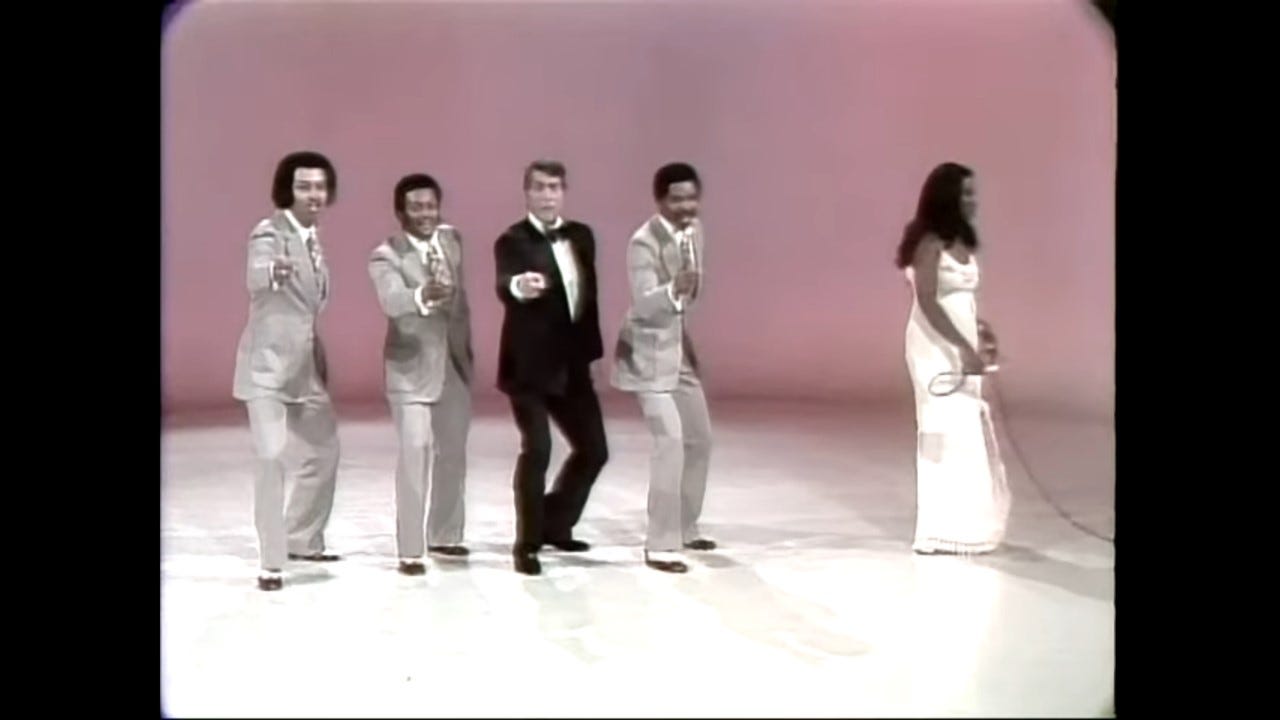
This article looked deeply into my soul. One of my favorite things in the entire world to do is to ONLY sing the Pips part whenever this song comes on. I've made people duet it with me at karaoke. I sing it in the shower. It's the only way I can even hear the song now. I'll gladly volunteer to be your Pips anytime. "A superstar but he didn't get far...... Dreams don't always come true. Nuh uh, no. Oh no."
I was in NYC for the past few days and only had the chance to read this when at the airport. As always, this is an excellent read and write-up, Richard. I love that you focused on the background vocals. I have often thought that background vocals can be a perfect addition and accent for a song. Strangely, for something that may be an afterthought or go unnoticed by the casual listener, backing vocals are like the herb or spice in a well-seasoned dish and can literally transform it. As you brilliantly point out with 'Midnight Train To Georgia."
I can also relate to this line right here:
>>"I felt all that needed to had been said or written about ‘Midnight Train to Georgia’, and partly because I’ve never really known how to approach in words this fabulous sonic creation.<<"
There have been songs, albums, and bands that I have had the same conundrum about. The voice in my head says "What more can I possibly add that hasn't already been said?" But then I always fall back on the personal and emotional element of the arts and write from my heart.
Thank you for this deep dive and for sharing your love of GK&TP and 'Midnight Train To Georgia' with us.